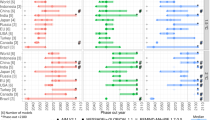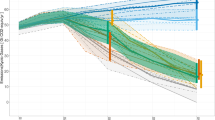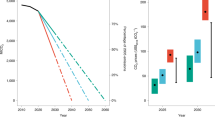Abstract
Tools are needed to benchmark carbon emissions and pledges against criteria of equity and fairness. However, standard economic approaches, which use a transparent optimization framework, ignore equity. Models that do include equity benchmarks exist, but often use opaque methodologies. Here we propose a utilitarian benchmark computed in a transparent optimization framework, which could usefully inform the equity benchmark debate. Implementing the utilitarian benchmark, which we see as ethically minimal and conceptually parsimonious, in two leading climate–economy models allows for calculation of the optimal allocation of future emissions. We compare this optimum with historical emissions and initial nationally determined contributions. Compared with cost minimization, utilitarian optimization features better outcomes for human development, equity and the climate. Peak temperature is lower under utilitarianism because it reduces the human development cost of global mitigation. Utilitarianism therefore is a promising inclusion to a set of benchmarks for future explorations of climate equity.
This is a preview of subscription content, access via your institution
Access options
Access Nature and 54 other Nature Portfolio journals
Get Nature+, our best-value online-access subscription
$29.99 / 30 days
cancel any time
Subscribe to this journal
Receive 12 print issues and online access
$209.00 per year
only $17.42 per issue
Buy this article
- Purchase on Springer Link
- Instant access to full article PDF
Prices may be subject to local taxes which are calculated during checkout




Similar content being viewed by others
Data availability
All data used in our version of the model is archived54 and freely available at https://github.com/Environment-Research/Utilitarianism.
Code availability
All model code used to generate results and create figures for this article is archived54 and freely available at https://github.com/Environment-Research/Utilitarianism.
References
Clarke L. et al. in Climate Change 2014: Mitigation of Climate Change (eds Edenhofer, O. et al) Ch. 6 (Cambridge Univ. Press, 2014).
Adoption of the Paris Agreement FCCC/CP/2015/L.9/Rev.1 (UNFCCC, 2015); https://unfccc.int/resource/docs/2015/cop21/eng/l09r01.pdf
Pauw, P., Mbeva, K. & van Asselt, H. Subtle differentiation of countries’ responsibilities under the Paris Agreement. Palgrave Commun. 5, 86 (2019).
Winkler, H. et al. Countries start to explain how their climate contributions are fair: more rigour needed. Int. Environ. Agreem. 18, 99–115 (2018).
Nationally Determined Contributions (NDCs) (UNFCCC, 2020); https://unfccc.int/process-and-meetings/the-paris-agreement/the-paris-agreement/nationally-determined-contributions-ndcs
Höhne, N. et al. Emissions: world has four times the work or one-third of the time. Nature 579, 25–28 (2020).
Ackerman, F., Stanton, E. A. & Bueno, R. CRED: a new model of climate and development. Ecol. Econ. 85, 166–176 (2013).
CSO Equity Review Fair Shares: A Civil Society Equity Review of INDCs. figshare https://doi.org/10.6084/m9.figshare.5917399 (2018).
CSO Equity Review Equity and the Ambition Ratchet: Towards a Meaningful 2018 Facilitative Dialogue. figshare https://doi.org/10.6084/m9.figshare.5917408 (2018).
Holz, C., Kartha, S. & Athanasiou, T. Fairly sharing 1.5: national fair shares of a 1.5 °C-compliant global mitigation effort. Int. Environ. Agreem. 18, 117–134 (2018).
Sheriff, G. Burden sharing under the Paris Climate Agreement. J. Assoc. Environ. Resour. Econ. 6, 275–318 (2019).
van den Berg, N. J. et al. Implications of various effort-sharing approaches for national carbon budgets and emissions pathways. Clim. Change 162, 1805–1822 (2020).
Zimm, C. & Nakicenovic, N. What are the implications of the Paris Agreement for inequality? Clim. Policy 20, 458–467 (2020).
Robiou du Point, Y. et al. Equitable mitigation to achieve the Paris Agreement goals. Nat. Clim. Change 7, 38–43 (2017).
Kartha, S. et al. Cascading biases against poorer countries. Nat. Clim. Change 8, 348–349 (2018).
Chichilnisky, G. & Heal, G. Who should abate carbon emissions? Econ. Lett. 44, 443–449 (1994).
Anthoff, D. Optimal Global Dynamic Carbon Abatement (Univ. California Berkeley, 2011).
Caney, S. Cosmopolitan justice, responsibility, and global climate change. Leiden J. Int. Law 18, 747–775 (2005).
Shue, H. Climate Justice: Vulnerability and Protection (Oxford Univ. Press, 2014).
Gardiner, S., Caney, S., Jamieson, D. & Shue, H. (eds) Climate Ethics: Essential Readings (Oxford Univ. Press, 2010).
Bykvist, K. Utilitarianism: A Guide for the Perplexed (Continuum, 2009).
Kagan, S. Normative Ethics (Routledge, 1998).
Singer, P. in Climate Ethics: Essential Readings (eds. Gardiner, S. et al.) 181–199 (Oxford Univ. Press, 2010).
Dooley, K. et al. Ethical choices behind quantifications of fair contributions under the Paris Agreement. Nat. Clim. Change 11, 300–305 (2021).
Adler, M. Measuring Social Welfare: An Introduction (Oxford Univ. Press, 2019).
Nordhaus, W. D. Economic aspects of global warming in a post-Copenhagen environment. Proc. Natl Acad. Sci. USA 107, 11721–11726 (2010).
Tol, R. S. J. The damage costs of climate change towards a dynamic representation. Ecol. Econ. 19, 67–90 (1996).
Global Carbon Atlas—CO2 Emissions (Future Earth; accessed October 2020); http://www.globalcarbonatlas.org/en/CO2-emissions
Robiou du Pont, Y. A Multidimensional Equity and Warming Assessments of National Climate Pledges (Paris Equity Check, accessed 10 September 2018); http://paris-equity-check.org/multi-equity-map.html
Pauw, W. P. & Klein, R. J. T. Beyond ambition: increasing the transparency, coherence and implementability of nationally determined contributions. Clim. Policy 20, 405–414 (2020).
Wei, T. et al. Developed and developing world responsibilities for historical climate change and CO2 mitigation. Proc. Natl Acad. Sci. USA 109, 12911–12915 (2012).
Adler, M. et al. Priority for the worse-off and the social cost of carbon. Nat. Clim. Change 7, 443–449 (2017).
Fleurbaey, M. & Zuber, S. Discounting, beyond utilitarianism. Economics 9, 1–52 (2015).
Broome, J. Climate Matters: Ethics in a Warming World (Norton, 2012).
Weyant, J. Some contributions of integrated assessment models of global climate change. Rev. Environ. Econ. Policy 11, 115–137 (2017).
Bosetti, V. & Frankel, J. Politically feasible emissions targets to attain 460 ppm CO2 concentrations. Rev. Environ. Econ. Policy 6, 86–109 (2012).
Edenhofer, O., Lessmann, K., Kemfert, C., Grubb, M. & Kohler, J. Induced technological change: exploring its implications for the economics of atmospheric stabilization: synthesis report from the Innovation Modeling Comparison Project. Energy J. 27, 57–107 (2006).
Nordhaus, W. D. & Sztorc, P. DICE 2013R: Introduction and User’s Manual (Yale Univ., 2013).
Hope, C. W. The marginal impacts of CO2, CH4 and SF6 emissions. Clim. Policy 6, 537–544 (2006).
Anthoff, D. Equity and Climate Change: Applications of FUND (Max Planck Institute, 2009).
Stern, N. Stern Review: The Economics of Climate Change (HM Treasury, 2006).
Dennig, F., Budolfson, M. B., Fleurbaey, M., Siebert, A. & Socolow, R. H. Inequality, climate impacts on the future poor, and carbon prices. Proc. Natl Acad. Sci. USA 112, 15827–15832 (2015).
Bataille, C., Guivarch, C., Hallegatte, S., Rogelj, J. & Waisman, H. Carbon prices across countries. Nat. Clim. Change 8, 648–650 (2018).
Sandmo, A. Global public economics: Public goods and externalities. Public Econ. 18–19, 3–21 (2007).
Sheeran, K. A. Who should abate carbon emissions? A note. Environ. Resour. Econ. 35, 89–98 (2006).
Budolfson, M. & Dennig, F. in Handbook on the Economics of Climate Change (eds. Chichilnisky, G. et al.) 224–238 (Edward Elgar Press, 2020).
Rawls, J. A Theory of Justice (Harvard Univ. Press, 1971).
Scanlon, T. M. What We Owe to Each Other (Harvard Univ. Press, 2000).
Diaz, D. & Moore, F. Quantifying the economic risks of climate change. Nat. Clim. Change 7, 774–782 (2017).
Anthoff, D. & Tol, R. S. J. Fund Documentation (2016); https://fundjl.readthedocs.io/en/latest/index.html
Lamb, W. F. & Rao, N. D. Human development in a climate-constrained world: what the past says about the future. Glob. Environ. Change 33, 14–22 (2015).
Rao, N. D. & Baer, P. “Decent living” emissions: a conceptual framework. Sustainability 4, 656–681 (2012).
Winkler, H. et al. Equitable Access to Sustainable Development: Contribution to the Body of Scientific Knowledge (BASIC Expert Group, 2011).
Budolfson, M. et al. Utilitarian benchmarks for emissions and pledges promote equity, climate and development. Zenodo https://doi.org/10.5281/zenodo.4618473 (2021).
Technical Update of the Social Cost of Carbon for Regulatory Impact Analysis Under Executive Order 12866 (Interagency Working Group on the Social Cost of Carbon, United States Government, 2016).
Nordhaus, W. D. & Boyer, J. Warming the World: Economic Models of Global Warming (MIT Press, 2000).
Iyer, G. et al. Implications of sustainable development considerations for comparability across nationally determined contributions. Nat. Clim. Change 8, 124–129 (2018).
Aldy, J. et al. Economic tools to promote transparency and comparability in the Paris Agreement. Nat. Clim. Change 6, 1000–1004 (2016).
Nordhaus, W. D. & Yang, Z. A regional dynamic general-equilibrium model of alternative climate-change strategies. Am. Econ. Rev. 86, 741–765 (1996).
Dennig, F. & Emmerling, J. A Note on Optima with Negishi Weights (Princeton Univ., 2017).
Stanton, E. A. Negishi welfare weights in integrated assessment models: the mathematics of global inequality. Clim. Change 107, 417–432 (2011).
Broome, J. Weighing Goods: Equality, Uncertainty and Time (Blackwell, 2003).
Broome, J. Equality versus priority: a useful distinction. Econ. Philos. 31, 219–228 (2015).
Adler, M. Future generations: a prioritarian view. George Wash. Law Rev. 77, 1478–1519 (2009).
Voorhoeve, A. & Fleurbaey, M. Priority or equality for possible people? Ethics 126, 929–954 (2016).
Monjon, S. & Quirion, P. A border adjustment for the EU ETS: reconciling WTO rules and capacity to tackle carbon leakage. Clim. Policy 11, 1212–1225 (2011).
Lockwood, B. & Whalley, J. Carbon-motivated border tax adjustments: old wine in green bottles? World Econ. 33, 810–819 (2010).
Aldy, J. E. & Pizer, W. A. The competitiveness impacts of climate change mitigation policies. J. Assoc. Environ. Resour. Econ. 2, 565–595 (2015).
Felder, S. & Rutherford, T. F. Unilateral CO2 reductions and carbon leakage: the consequences of international trade in oil and basic materials. J. Environ. Econ. Manage. 25, 162–176 (1993).
Flannery, B., Hillman, J., Mares, J. W. & Porterfield, M. Framework Proposal for a US Upstream Greenhouse Gas Tax with WTO-Complaint Border Adjustments (Resources for the Future, 2018).
Golosov, M., Hassler, J., Krusell, P. & Tsyvinski, A. Optimal taxes on fossil fuel in general equilibrium. Econometrica 82, 41–88 (2014).
Acknowledgements
Research by D.S. is supported by the National Institute of Child Health and Human Development (NICHD) grants K01HD098313 and P2CHD042849. The content is solely the responsibility of the authors and does not necessarily represent the official views of the National Institutes of Health.
Author information
Authors and Affiliations
Contributions
All authors contributed equally to this work. M.B.B., D.A., F.D., N.K.D., F.E. and D.S. designed the research. F.D., F.E. and K.K. led the computer modelling, M.B.B., F.E., K.K. and D.S. designed the figures and F.E., K.K. and D.S. constructed the figures. M.B.B., N.K.D. and D.S. wrote the main paper and M.B.B. wrote the Supplementary Information. All authors discussed the results and implications and commented on the manuscript.
Corresponding authors
Ethics declarations
Competing interests
N.K.D. is a member of the committee advising the Government of India on analysis of low carbon trajectories. All other authors declare no competing interests.
Additional information
Peer review information Nature Climate Change thanks Diane Coyle and the other, anonymous, reviewer(s) for their contribution to the peer review of this work.
Publisher’s note Springer Nature remains neutral with regard to jurisdictional claims in published maps and institutional affiliations.
Extended data
Extended Data Fig. 1 Cumulative emissions per capita converge over the 21st century under utilitarianism.
The vertical axis plots, for each year, (cumulative emissions by region since 1900 up to that year) divided by (the total population, measured as person-years, lived in that region since 1900 up to that year). The high levels for USA in 2020 are the result of far higher emissions through the 20th century than the poorer regions plotted. Only countries are presented for which we have adequate population and emissions data going back to 1900.
Extended Data Fig. 2 Multi-Model Robustness.
Implementing the utilitarian method in the FUND model. The top row replicates Fig. 2c-d for RICE, while the bottom row displays the analogous results in the FUND model, which is known to have substantively different assumptions and structure.50 (See FUND documentation for details of the FUND model.51) The main results of the paper—that regional emission allocations are heavily tilted towards developing countries in the utilitarian optimum—also hold in the FUND model. (See also Anthoff 2011.18) We optimize FUND through 2300 with the same discounting parameters and utilitarian objective function used to generate our main results with RICE. The FUND results assume that regional carbon taxes can go no higher than $5000/ton CO2 and remain constant after 2200.
Supplementary information
Supplementary Information
Supplementary Information.
Rights and permissions
About this article
Cite this article
Budolfson, M.B., Anthoff, D., Dennig, F. et al. Utilitarian benchmarks for emissions and pledges promote equity, climate and development. Nat. Clim. Chang. 11, 827–833 (2021). https://doi.org/10.1038/s41558-021-01130-6
Received:
Accepted:
Published:
Issue Date:
DOI: https://doi.org/10.1038/s41558-021-01130-6
This article is cited by
-
Justice considerations in climate research
Nature Climate Change (2024)
-
Spatio-temporal differences and influencing factors of carbon emission equity in the Loess Plateau based on major function-oriented zones
Journal of Geographical Sciences (2023)
-
Contrasting suitability and ambition in regional carbon mitigation
Nature Communications (2022)
-
Optimal climate policies under fairness preferences
Climatic Change (2022)
-
Climate action with revenue recycling has benefits for poverty, inequality and well-being
Nature Climate Change (2021)



